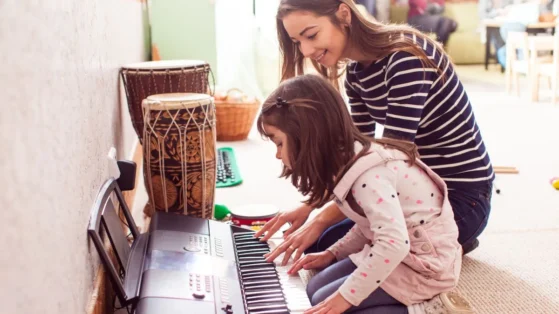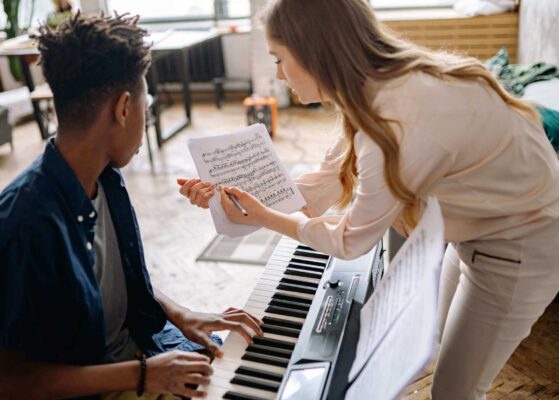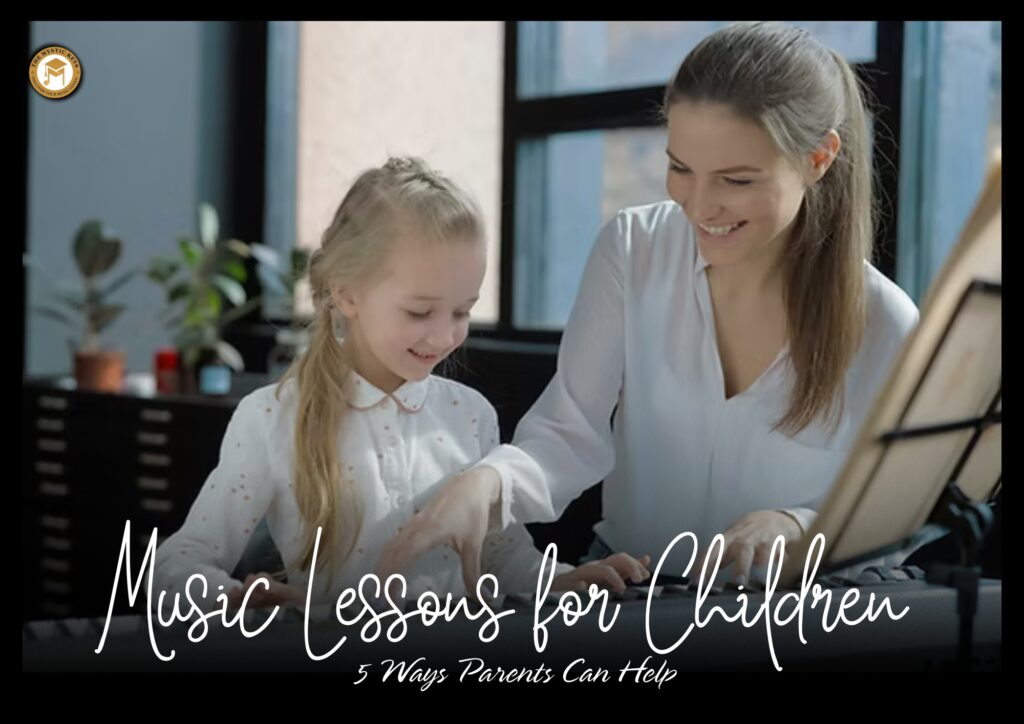Music Lessons for Children | 5 Ways Parents Can Help
When a child begins their musical journey, it is not just an individual pursuit—it becomes a family experience. Behind every young pianist, guitarist, vocalist, or violinist is a parent who encouraged their first note, waited outside during countless music lessons for children, or clapped louder than anyone at their first recital. These moments, while small in isolation, form the emotional backbone of a child’s growth in music—turning practice into purpose and performance into pride.
But what does meaningful support really look like?
It’s easy to think that musical progress is only about regular practice or expensive instruments. In reality, a child’s development as a musician depends just as much on the emotional and psychological environment surrounding their learning. Parents don’t need to be musically trained themselves; they simply need to be present, patient, and purposeful.
Let’s explore five essential ways parents can play an active role in nurturing and sustaining their child’s passion for music.

Foster a Musical Atmosphere at Home
Music thrives in an environment where it feels natural, celebrated, and alive. One of the most impactful things parents can do is to normalize music in everyday life.
Play different styles of music around the house—from classical and jazz to folk, gospel, or even film scores. Let music be a part of dinner time, study time, and weekend family moments. Talk about what you’re hearing. Ask your child what they think or how it makes them feel. Even these simple conversations can plant seeds of curiosity and emotional connection.
Beyond listening, create a space where your child feels encouraged to practice freely—without pressure or interruption. It doesn’t have to be a studio. Just a well-lit corner with their instrument, a music stand, a metronome, and perhaps a few motivational quotes or posters can do wonders. This quiet nook becomes their own creative sanctuary.
A musical home doesn’t have to be perfect—it just needs to be intentional.

Take an Interest in Their Practice Without Taking Over
Once your child begins formal lessons, your involvement during practice becomes a balancing act. You want to show support, but not micromanage. So how can you stay involved in a healthy and empowering way?
Start by helping them build a consistent practice routine that fits their daily schedule. Instead of focusing on long hours, encourage short, focused practice sessions with regular breaks. Young children especially benefit from visual reminders, such as practice charts or stickers, to track their efforts.
During practice, your presence alone can make a difference—especially during those crucial early stages of music lessons for children. Sit nearby with a book, occasionally offer gentle encouragement, or simply listen without judgment. You don’t need to correct their mistakes—leave that to the teacher. What they need from you is calm, patient support, and the quiet reassurance that you’re there for them, no matter how the session goes.
As they grow older, help them reflect on their own progress. You might say, “That part sounded much clearer today,” or “I noticed how you slowed down to get that tricky section right—well done!” These comments reinforce effort, which is far more powerful than focusing solely on talent.

Emphasize Growth, Not Perfection
Music education is full of ups and downs. Some days will be smooth and joyful; others will bring frustration and fatigue. This is where your mindset as a parent can shape how your child sees themselves.
It’s natural for children to compare themselves to others—especially in group classes or recitals. As a parent, your role is to help them understand that progress matters more than perfection.
If they stumble during a performance, avoid phrases like “Why didn’t you practice more?” Instead, ask them how they felt about it, and what they learned. Celebrate the fact that they had the courage to perform. Applaud their ability to keep going, even when they make mistakes.
You can also use setbacks as opportunities to talk about resilience, self-discipline, and emotional expression. These are the true lifelong benefits of music education—far more valuable than any single flawless performance.
Over time, when a child internalizes that their effort is more important than comparison, they begin to enjoy music for themselves—not just for applause.

Build a Strong Relationship with Their Music Teacher
Just as parents and school teachers work together to support a child’s academic growth, building a good rapport with your child’s music teacher can make a world of difference.
Attend parent-teacher meetings or music open houses. Communicate openly about your child’s progress, challenges, or changes at home that might affect their learning. Ask thoughtful questions like:
“Is my child engaged during lessons?”
“What kind of support can I offer at home?”
“Do you see any particular strengths developing?”
These conversations help you stay informed and allow the teacher to better tailor the music lessons for children to your child’s needs. By maintaining open communication, you ensure that each lesson is personalized, engaging, and aligned with your child’s strengths and areas for growth. This partnership between parent and teacher creates a supportive environment where your child can thrive musically and develop a lasting love for their instrument.
If your child attends a music academy like The Mystic Keys, look out for recitals, seasonal workshops, or showcase videos that involve family engagement. Even watching your child perform in a small online concert can boost their confidence significantly.
When parents and teachers collaborate, the message to the child is loud and clear: your growth matters to all of us.

Expose Them to Inspiring Musical Experiences
A child may start music with curiosity, but it’s inspiration that keeps that flame alive. To deepen their love for music, offer them experiences that go beyond daily practice.
Attend live performances together, whether it’s a local choir concert, a community orchestra, or a visiting jazz band. Many cities offer family-friendly music events, and even virtual concerts can offer exposure to different cultures and styles.
You can also encourage your child to participate in ensemble playing, talent shows, or music competitions—not for the prize, but for the experience. These events teach valuable skills like teamwork, stage presence, and handling pressure.
And don’t overlook the power of role models. Watch interviews with young artists. Share stories of musicians who started small and worked their way up. If possible, arrange a casual chat with an older student or music teacher who can share their journey. These real-life connections often leave a lasting impression.
The more your child sees music as part of a broader, exciting world, the more likely they are to stay passionate and committed.

Final Thoughts | Every Parent Can Be a Music Mentor
Supporting your child’s musical journey doesn’t require you to be a professional musician. What matters most is your willingness to walk beside them—not ahead of them, and never behind them.
Whether it’s a five-minute chat about a favorite song, a quiet nod during practice, or a warm hug after a performance, your presence adds depth and meaning to their experience. You’re not just watching them become a musician—you’re helping shape the person they’re becoming.
At The Mystic Keys, we believe that music is not just a skill—it’s a lifelong companion. And when families nurture music at home, the journey becomes richer, more joyful, and deeply fulfilling.
So take a moment today to listen, to encourage, and to celebrate. Because when a parent believes in a child’s music, the melody never fades.
For more information and exciting resources about learning music, visit our website at The Mystic Keys. For more music content and exciting offers follow us on
Facebook, Instagram, YouTube, LinkedIn, Twitter, Pinterest, and Threads,








